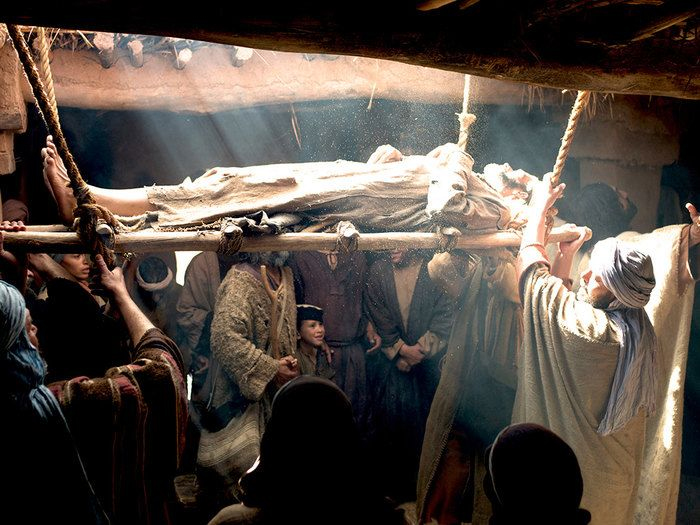Christian Art | Jesus Heals The Paralytic Man
Mark 2: 1-12 (cf. Luke 5: 18-26 & Matthew 9: 2-8) 7th Sunday Year B and Week 1 Ordinary Time, Friday (Audio Bible KJV, Spoken Word)
1 AND again he entered into Capernaum, after some days; and it was noised that he was in the house.
2 And straightway many were gathered together, insomuch that there was no room to receive them, no, not so much as about the door: and he preached the word unto them.
3 And they come unto him, bringing one sick of the palsy, which was borne of four.
4 And when they could not come nigh unto him for the press, they uncovered the roof where he was: and when they had broken it up, they let down the bed wherein the sick of the palsy lay.
5 When Jesus saw their faith, he said unto the sick of the palsy, Son, thy sins be forgiven thee.
6 But there were certain of the scribes sitting there, and reasoning in their hearts,
7 Why doth this man thus speak blasphemies? who can forgive sins but God only?
8 And immediately when Jesus perceived in his spirit that they so reasoned within themselves, he said unto them, Why reason ye these things in your hearts?
9 Whether is it easier to say to the sick of the palsy, Thy sins be forgiven thee; or to say, Arise, and take up thy bed, and walk?
10 But that ye may know that the Son of man hath power on earth to forgive sins, (he saith to the sick of the palsy,)
11 I say unto thee, Arise, and take up thy bed, and go thy way into thine house.
12 And immediately he arose, took up the bed, and went forth before them all; insomuch that they were all amazed, and glorified God, saying, We never saw it on this fashion.
The words of Jesus to the paralytic man on his bed might have seemed strange and even, at first, insensitive: the paralytic has been brought to Jesus seeking to be healed, and Jesus says to him: ‘Son, thy sins be forgiven thee.’ This could hardly be what the paralysed man might have been expecting.
Jesus at this point takes a little bit more control over the message he wishes the people, his creation, to receive and to take on board and to understand about him.
The fame of Jesus has spread through the land. He has returned to Capernaum and as soon as he does so the news spreads, the gossip and rumour mill churns, and people once again clamour for his attention. We might even think in this respect of modern day celebrity, in the sense that: the star is in town.
Jesus uses this moment not initially to heal but to preach. It is a beautiful thought that it may be that this is what the people were thronging to hear. Perhaps they did not even know why they were there to see and to hear our Lord. But they longed to be near him. The people of Biblical times, while in a sense lost and confused, nevertheless retained in their souls, in their heart of hearts, the ardent desire to be close to the true God.
Throughout the Bible, we hear of the longing of the people of God for the Messiah. Now here he is: present, visible, and moreover as a human, as one of us. Now we understand these people’s hunger to be near and to be with Christ. They’re just like us. Their hunger is our own. We are as they are.
Faith and healing remain combined, indeed inextricably linked, as is in accord with the Jewish teaching of Biblical times. Jesus teaches the word and Jesus heals: these two core activities of the ministry of our Lord are essentially one. The healing and the preaching of the Word of God are as one.
We witness in this Gospel reading both the resolute determination of those carrying the paralytic man to reach unto the presence of Jesus and the infinite compassion and love of our Lord to admit the sick and the needy into his presence. The paralytic man cannot reach Jesus all by himself, by his own efforts. He can’t get there alone. He needs help. And so it is, as St Jerome describes, that there is a kind of spiritual paralysis into which a person may have sunk that it profits that person to draw on the assistance of our brother man to bring that person as it were to life again, our life in Christ. And here in the Gospel he is: Christ is patiently waiting.
Christ not only sees the sickness of the paralysed man; he sees the faith of those who have brought him. We are thusly instructed of the great value of our fellowship in Christ, of our communion and our seeing God and the image of Christ in our fellow man. We are called to be a community, the lay as the religious. We are called to see God in and through each other.
The response of the scribes is typical of a mode of thought and religious belief which Christ came down to us to overturn. They see blasphemy. We might flinch from imagining that: the thought of Christ blaspheming! ‘Who can forgive sins but God alone?’ they say. Well here he is. We know this, but those scribes could not let themselves do so.
Jesus knows what the scribes are thinking, perhaps mumbling among themselves, and he does something clever. Rather than confront the scribes outright on their own and now obsolete terms, he presents them with a question: what is better, to say our sins are forgiven or to heal? Now the physical healing of the sick and the spiritual healing and redemption of Christ are held together in one breath and as a sign.
Jesus explicitly tells those assembled that this is a sign. In other words, Jesus is telling us that his primary purpose on Earth, his mission as he was sent by the Father, is not to be a medical doctor to the physically sick; it is to heal our souls. The healing of the sick, though miraculous and through the word alone of Christ, is nevertheless only a sign, signifying that which is so very much greater.
The people are all amazed. We are now amazed at this account of Christ’s mercy and love and his sheer ability to help the people of his time toward faith. They proclaim: ‘We never saw it on this fashion.’ We never saw anything like this.
Seeing is believing. Christ gave these miracles to us for all time such that through seeing we too may believe.
![]()

![]()








